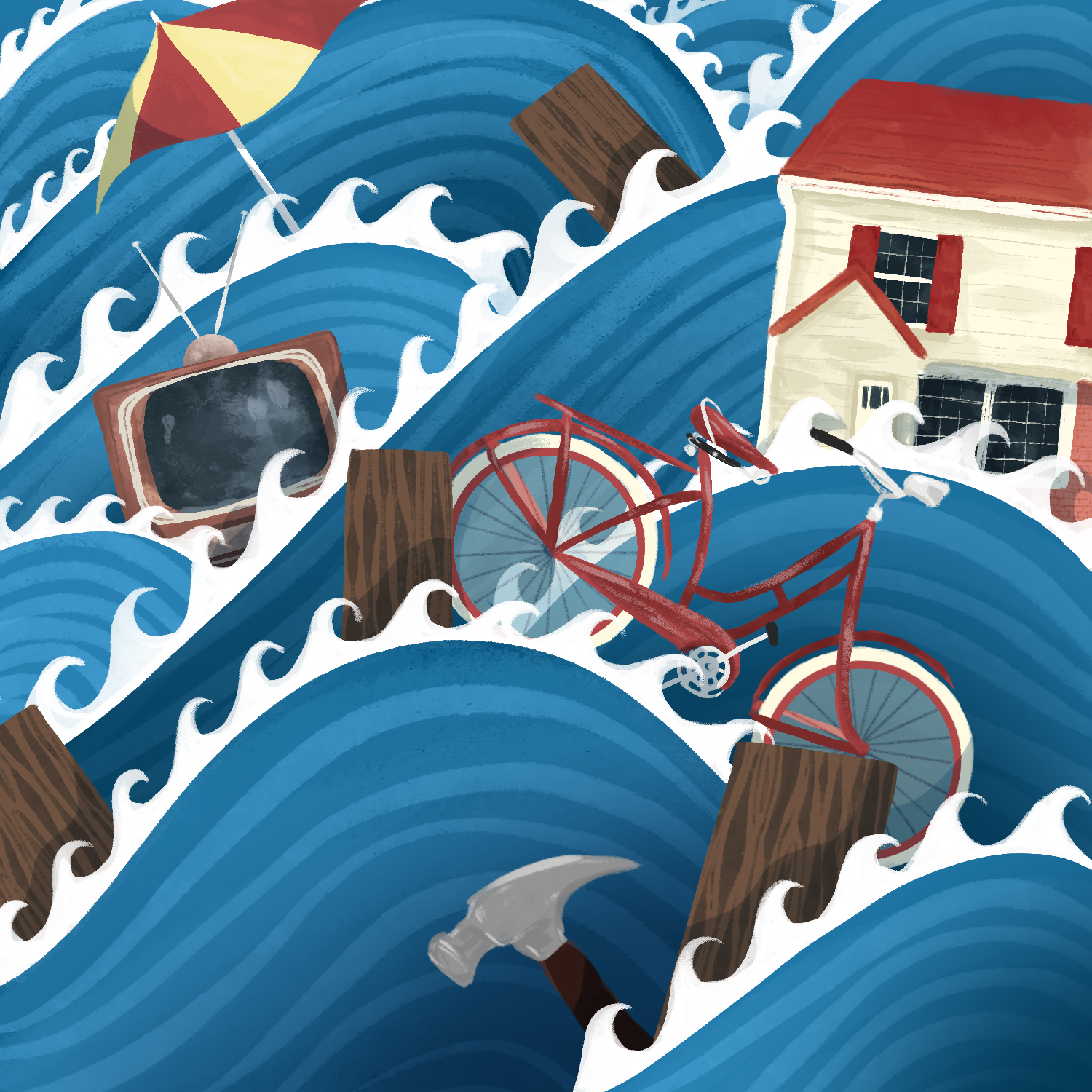There Goes the Neighborhood

art by Cara Search
Consider the suburbs: sprinklers and bicycles, sparrows and sunbathers. In the distance, the clangs of hammers over nails.
Now, consider the neighbors, muttering: kids these days, always with their heads in the clouds and those damned make-believe games, they haven’t stopped building their infernal contraption all summer.
Consider the backyard tree copse: the reverberation stopping as five children turn somber faces to the clear sky, asking is it happening soon, do you think? Is this what we’ve been preparing for?
Consider the children, building: not a tree house or summer school project, but an ark.
And the memory of the hot, dry August woven through every blade of grass: how the sprawling ark started as merely a pile of discarded wooden planks and bent nails held clumsily together by two pairs of little clairvoyant hands. How, soon, they were joined by a choir of hammers as the neighborhood children banded together to build their misshapen escape.
Consider the Markou twins: how one foresaw the Ark; the other, the Flood.
And Antigone, their older-cousin-turned-adopted-sister who eavesdropped on their nightmares, who wished for a swift, soft Armageddon even as she helped her cousins gather woodworking supplies with her razor-scarred hands; even as she dreamed sweetly of the flood coming and sweeping her away like the fetus she aborted not too long ago. Like Antigone wished her mother had done with her.
Consider Maria, the first disciple and the neighbors’ youngest daughter, climbing up the fence to reach the half-made Ark. And Maria’s lisped confession: It’s because my mom is dying. She grew up by the ocean. Promised when she was gone from this world, she would bring the ocean to meet me.
Consider the counterargument: Iasonas, former bully, fastest hammerer and ignorer of muscle fatigue, saying, What if it is me who brings forth the flood? The memory of a field much like the Markou backyard, and the smirking face of another boy whose roving hands refused to stop, who laughed and said, aren’t you the school bully, why are you crying, why don’t you make me stop? And Iasonas, frozen stiff and staring at the sky hoping for rain, for a deluge, a manifestation of trapped turmoil.
Consider the curse of memory: how, during a fight, Antigone said she wished the twins had never been born. Maria blaming the twins for the ruined fence between their families’ properties after she ripped the planks apart with her cancer-diagnosis- dying-mother rage. Iasonas, twisting the twins’ wrists behind their backs, calling them filthy, calling them fags.
And the weight of realization: no time for animosity or apologies in the race for survival, only the hammering of nails bringing prophets and disciples together in perfect synchronicity.
Consider the children: working.
And the children, at rest. Antigone, dreaming of letting the neighbors who called her things like crazy, like whore, drown right before her eyes. Saving only their dog leashed by the gate, barking at the swelling water level. Maria, who pictures the sea swallowing all the many curious machines keeping her mother alive, smothering their
incessant white noise. Iasonas, who once upon a time dreamed of kissing boys, then wondered if his wishes summoned the wrong boy his way. His dreams, after a sweat- drenched day of work, blissfully quiet.
Consider the Markou twins: staring at each other while the rest of the children nap in the spiderwebbed grass next to their wooden creation. How they alone know only one twin will survive the coming flood, the water of the world’s womb belatedly absorbing one half back into the ether. How, even in dreams and visions, they cannot tell each other apart.
Perhaps we should have considered the adults earlier: the twins’ father spitting at the boat and inside his collar, crossing himself, calling the ark a blasphemous abomination. You cannot predict god’s wrath lest you incur it yourselves, boys. I’m never setting foot on that toy boat of yours.
And their mother, knocking on the ark’s coarse wood whenever she hears the children’s stories of floods and demises. And afterwards, standing in front of an unevenly microwaved dinner, counting the splinters on her knuckles as the TV plays something cheerful, something distant, as if through a wall of water. Mrs. Markou looking furtively out the window where the ark looms large and foreboding, where the children sleep around it night after night, netting it in dreams.
Consider the dawn: and with it, the undulating heat–how it belies the coming of the flood.
Now, the trickle of rain: a single drop moistening the ground, an augur of misdirection. The children sitting up from the grass, springing into action to check
their provisions, the rope coils to tether themselves to their ark, the ladders to pull up every non-believer caught in the drift.
Consider the waking neighborhood: newspapers tossed on lawns and milk bottles left on stoops, doomed to join the deluge. The adults going out, glaring at the sky and the sun hidden behind a grim cloud cover, a gray-churn ruining the adults’ sunbathing and country club meetings.
But consider this: what the Markou twins know is that the flood won’t come from above, but from below. The low rumble of water lullabying the thirsty earth while the neighborhood stares bemused at the sky.
And after them, the flood.


